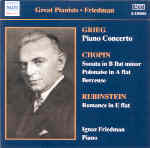Volume 2 in Naxos’ chronological survey of Ignaz Friedman’s complete recordings kicks off with four titles that are remakes of selections the pianist recorded earlier: Mendelssohn’s E minor Scherzo, Friedman’s own Elle Danse, plus the Beethoven “Moonlight” sonata’s second and third movements. The second Mendelssohn and Friedman “takes” indeed improve upon the first attempts in how Friedman’s rubato and articulation take on greater specificity. While the Beethoven remakes offer sonic improvement, I don’t quite share Friedman’s dissatisfaction with his first versions. The Allegretto is just as deliberate as the earlier take, with inner voices coaxed to the maximum, yet it sounds a bit arch this time around. In the Finale remake, Friedman doesn’t control his breackneck tempo as adroitly as he did a few months earlier (the trills, for instance, are less well executed).
I’ve never warmed to Friedman’s Grieg Concerto (sadly, his only commercially released piano and orchestra outing). In addition to the drab sonics and hapless orchestra, Friedman overdoes the solo part, pushing crescendos past their threshold and adding numerous melodic embellishments that are too fancy for the idiom to bear. On the other hand, his “grand manner” approach to the Chopin “Black Key” and “Butterfly” Etudes, as well as the B-flat Mazurka Op. 7 No. 1 and his own charming salon pieces, will send aspiring pianists away talking to themselves.
Friedman’s filigree in the Berceuse is pianistically dazzling, but it misses the music’s lulling, tender point. But listen to Rubinstein’s unpretentious E-flat Romance, and to how Friedman aristocratically sculpts the right-hand melody over the barlines, while the left hand accompaniment occupies its own, independent orbit. The effect is sophisticated, magical, and natural as breathing. In sum, the Complete Friedman, Vol. 2 has its ups and downs, but the ups are sky high, as are Ward Marston’s transfers.
































